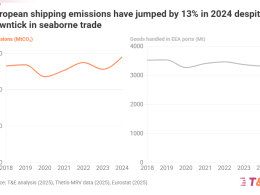Small and medium-sized enterprises (SMEs), which comprise 90% of businesses globally and are responsible for 40–60% of business-sector greenhouse gas (GHG) emissions, remain under-supported in the global transition to sustainability, according to a new white paper released by the World Economic Forum.
The report, Sustainability Meets Growth: A Roadmap for SMEs and Mid-Sized Manufacturers, produced in collaboration with Schneider Electric, argues that accelerating sustainable practices among SMEs could significantly advance progress towards the Paris Agreement goals while unlocking new avenues for economic growth.
Framing sustainability as a strategic opportunity rather than a cost, the report presents a five-stage roadmap to help SMEs and mid-sized manufacturers embed environmental sustainability into their operations and business models. It also calls for enhanced support from both public and private sectors to address existing barriers.
“Small and mid-sized manufacturers have the potential to be powerful multipliers of climate action, particularly in decarbonising value chains, as they play a critical role in global supply networks,” said Kiva Allgood, Managing Director at the World Economic Forum. “The roadmap in the report demonstrates how sustainable transformation is not only viable for smaller manufacturers – sustainability can also be leveraged as a competitive advantage in today’s fast-evolving economic and regulatory landscape.”
Global commitments under the Paris Agreement require GHG emissions to peak before 2025 and decline by 43% by 2030 to limit global warming to 1.5°C. However, current trajectories indicate the world remains far from achieving these targets.
Drawing on a global survey of over 60 SMEs from across Europe, MENA, Africa, Asia, and the Americas, the report highlights a shifting mindset within the manufacturing sector:
- 68% of respondents had a positive outlook on sustainability.
- 38% already view sustainability as a business opportunity.
- 60% cited customer demand as the key driver for action, outpacing regulatory pressure.
Despite growing awareness, SMEs continue to face significant hurdles. Over half (53%) identified competing priorities such as cost and business expansion as their biggest challenge, followed by policy uncertainty (47%) and lack of financial resources (42%).
To overcome these challenges, the report calls for a tailored support framework, including access to finance, policy clarity, implementation support, and knowledge-sharing platforms.
“The future of manufacturing depends on empowering SMEs and mid-sized companies to lead the way towards a more sustainable and inclusive global economy,” said Esther Finidori, Chief Sustainability Officer at Schneider Electric. “The leading manufacturers of tomorrow will be those who use sustainability as a competitive edge, building resilient and high-performance value chains.”
The white paper concludes that aligning SME sustainability with business growth is not just feasible—it is essential to achieving climate goals and ensuring long-term competitiveness in the global economy.
















